译林版六年级英语下册 Project 1 Being a good student(Part A)课件(共51张PPT)
文档属性
| 名称 | 译林版六年级英语下册 Project 1 Being a good student(Part A)课件(共51张PPT) |

|
|
| 格式 | pptx | ||
| 文件大小 | 51.3MB | ||
| 资源类型 | 教案 | ||
| 版本资源 | 牛津译林版 | ||
| 科目 | 英语 | ||
| 更新时间 | 2021-06-24 00:00:00 | ||
图片预览

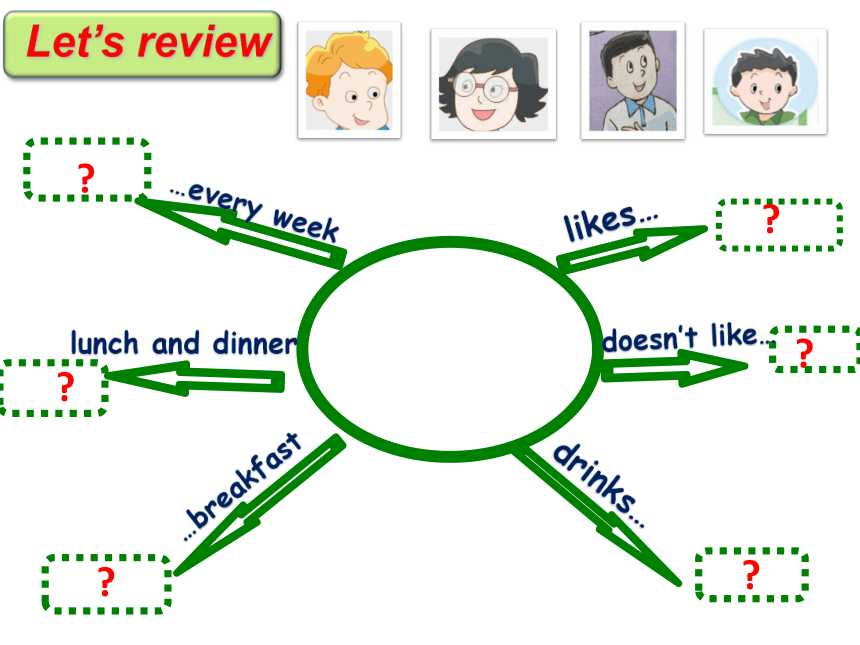



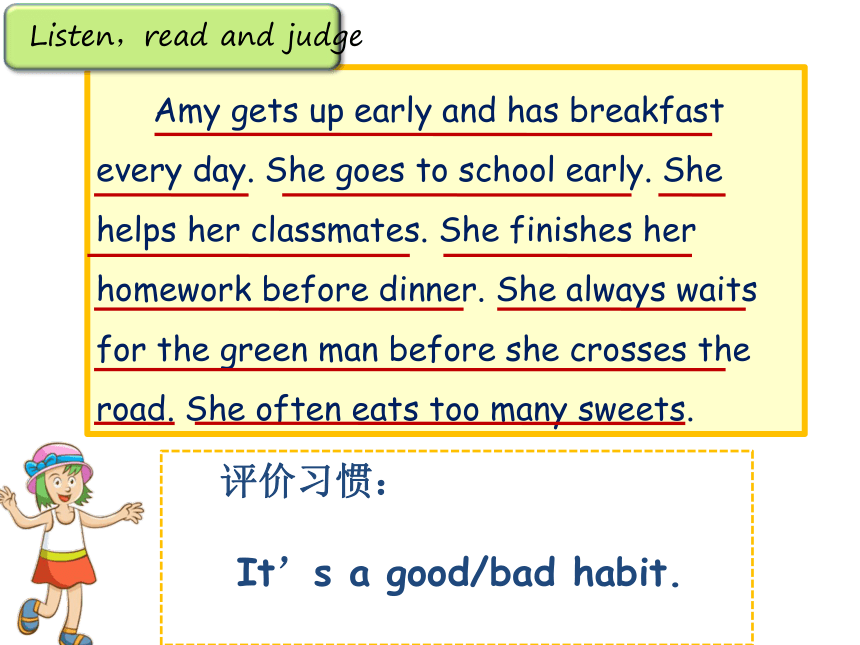
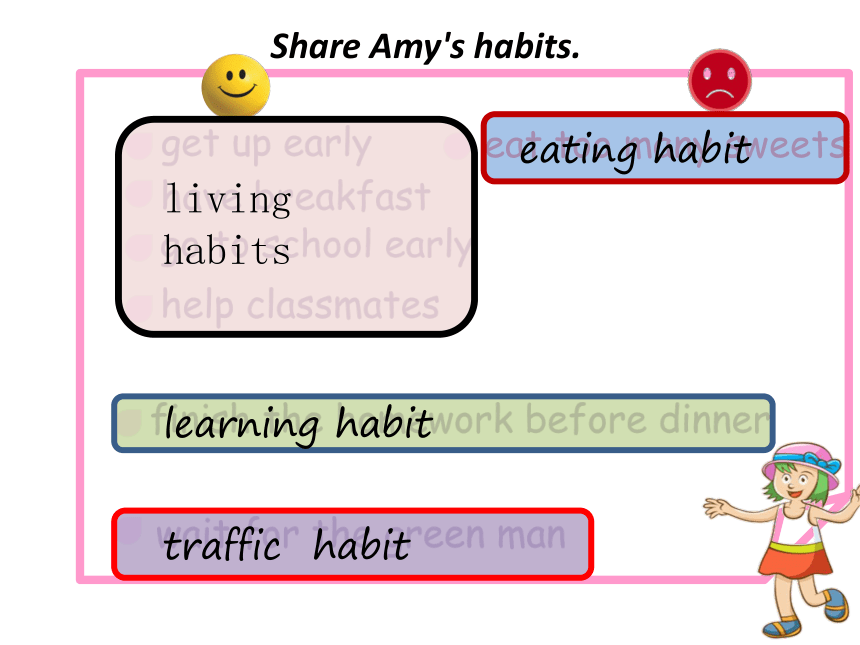
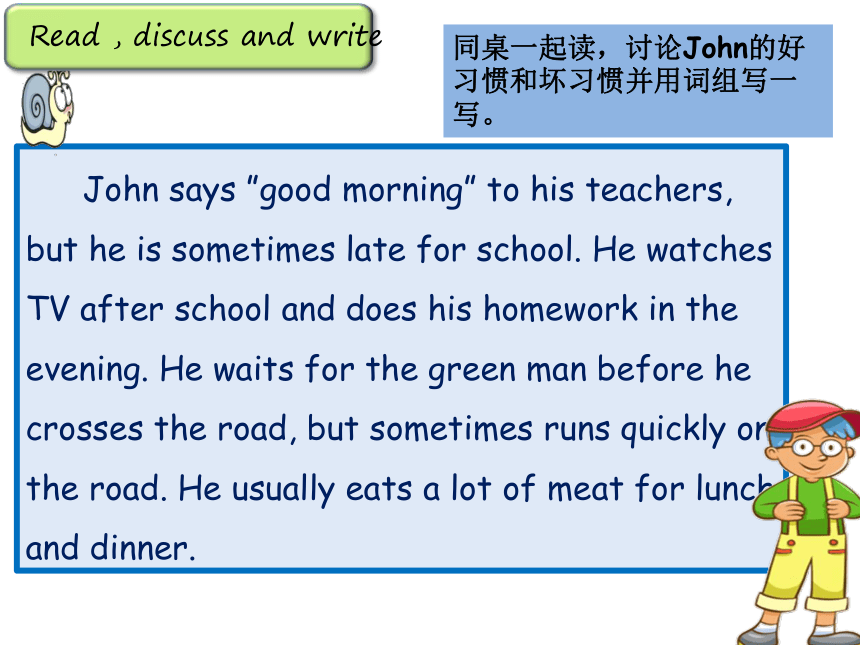
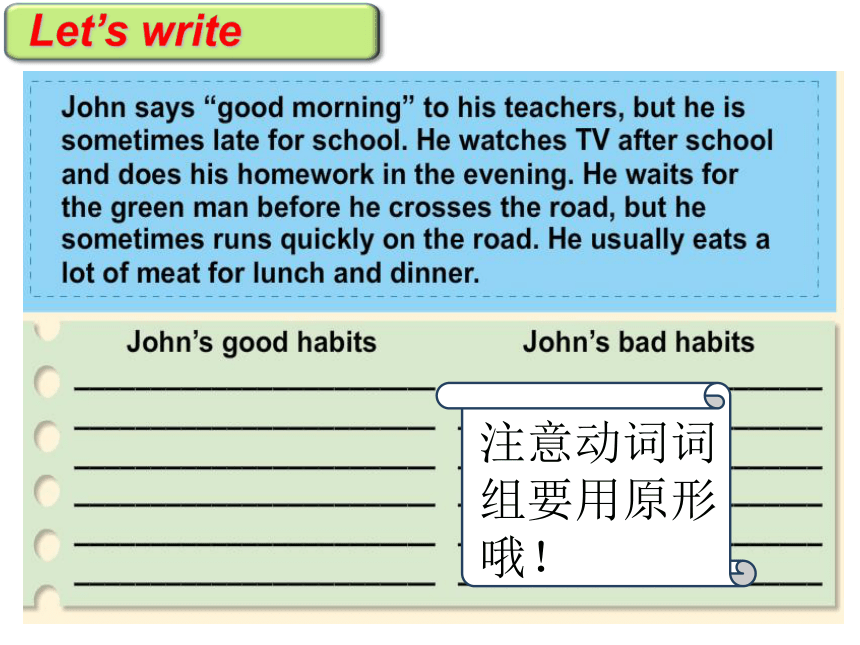
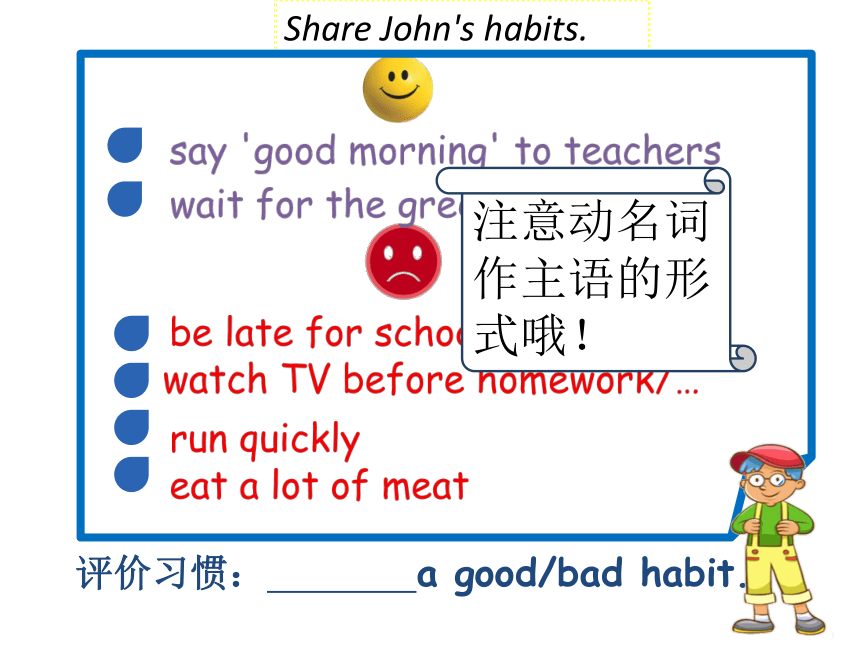
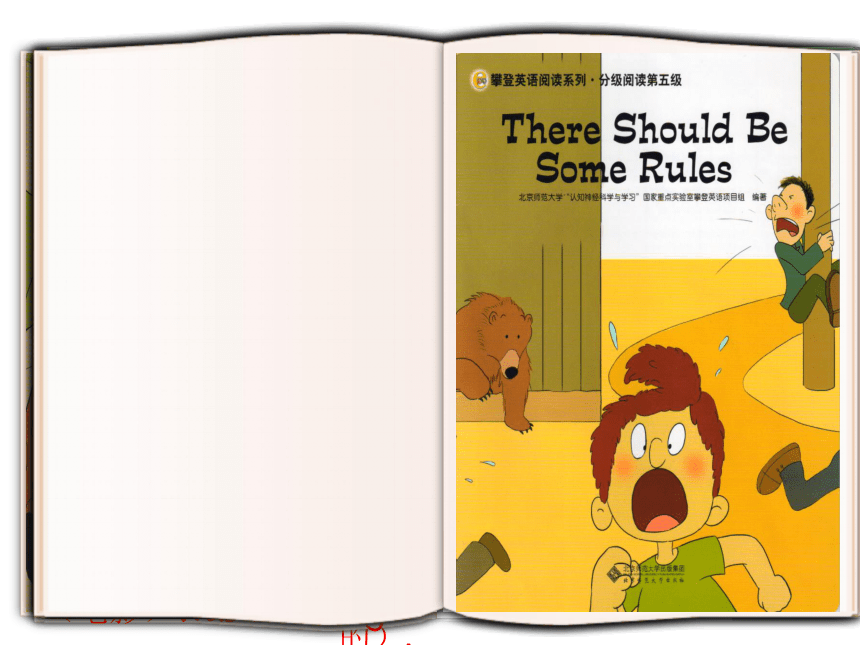
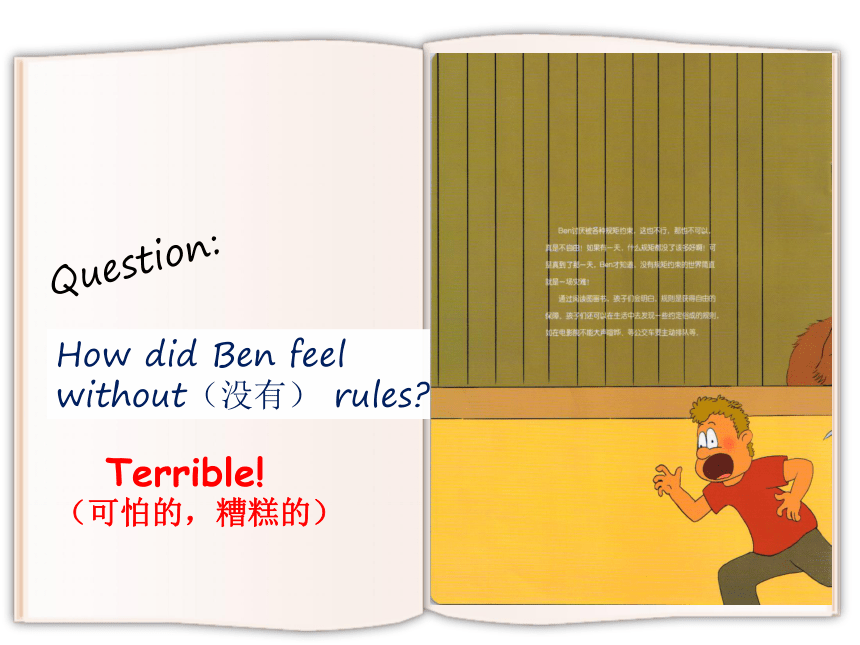
文档简介
Revision 1
Being a good student
(Period 1)
Let’s review
?
?
?
?
?
?
likes…
drinks…
lunch and dinner
doesn’t like…
…breakfast
…every week
Let’s review
?
?
?
breakfast
. . .
lunch and dinner
Let’s review
Let’s review
?
?
?
Amy gets up early and has breakfast every day. She goes to school early. She helps her classmates. She finishes her homework before dinner. She always waits for the green man before she crosses the road. She often eats too many sweets.
评价习惯:
It’s a good/bad habit.
Listen,read and judge
eat too many sweets
get up early
have breakfast
go to school early
help classmates
finish the homework before dinner
wait for the green man
Share Amy's habits.
living habits
learning habit
traffic habit
eating habit
John says ”good morning” to his teachers, but he is sometimes late for school. He watches TV after school and does his homework in the evening. He waits for the green man before he crosses the road, but sometimes runs quickly on the road. He usually eats a lot of meat for lunch and dinner.
Read , discuss and write
同桌一起读,讨论John的好习惯和坏习惯并用词组写一写。
Let’s write
注意动词词组要用原形哦!
Share John's habits.
评价习惯: a good/bad habit.
wait for the green man
be late for school
eat a lot of meat
say 'good morning' to teachers
watch TV before homework/…
run quickly
注意动名词作主语的形式哦!
Wow, what a disaster without (没有)rules! Ben felt terrible(可怕的).
Ben felt bad.
He wanted to leave. Suddenly a bear rushed (冲)at him. Someone let the bear out! Ben ran away.
Ben wasn’t having fun.
He went to the zoo.
He went to the monkey hill.
“Don’t feed(喂) the animals!”
“Ha, no rules now!”
Ben went to the cinema.
His favourite movie (电影)was showing.
In the cinema, many people were talking and walking.
Ben couldn’t hear or see the film.
Suddenly(突然), the quiet classroom became noisy.
“Hey! Don’t throw things in the classroom.”
“Ha, there are no rules now.”
“Did my wish come true(实现)?”
Ben felt happy.“Now I can go play!”
“Ben, stop daydreaming!”
(白日梦)
“Ben, no talking!”
“Ben, don’t eat in class!”
“I hate rules. I don’t want any rules!”
How did Ben feel without(没有) rules?
Question:
Terrible!
(可怕的,糟糕的)
Question:
Where did Ben go?
Classroom
Cinema
Zoo
Classroom
messy
noisy(吵闹的)
throw things
play
Cinema
talk
walk
Zoo
terrible(可怕的)
feed the animals
let the bear out
Try to ask
…?
…?
…?
…?
…?
Discuss and ask
…watch TV…?
…
…waste food…?
…keep safe…?
…do his homework…?
…get up…?
Does he usually watch TV ?
What food does he waste ?
How does he keep safe on the road?
When does he sometimes do his homework ?
Does he often get up early ?
四人小组讨论,选话题提问,预测问题。
What…?
Does…?
When…?
How…?
…?
He usually puts his things in order and keeps
the desk clean.He sometimes does his homework
quickly after class.
He sometimes wastes some food,because he
never eats any fat meat.He always eats a lot
of vegetables and fruit. He often gets up early
except weekends.He seldom watches TV.
To keep safe,he often walks on the left side of
the road.He always crosses the road carefully.
He wants to do better in the future.
……
Read and answer
阅读短文,回答问题
He usually puts his things in order and keeps
the desk clean.He sometimes does his homework
quickly after class.
He sometimes wastes some food,because he
never eats any fat meat.He always eats a lot
of vegetables and fruit. He often gets up early
except weekends. He watches TV.
To keep safe,he often walks on the left side of
the road.He always crosses the road carefully.
He wants to do better in the future.
……
Question1:
Does he usually watch TV?
No, he doesn’t.
很少
[e] [? ]
seldom
seldom
in the suitable time
适时
never
seldom
sometimes
often
usually
always
Summary 1
频度副词在句子中一般放行为动词前,be动词,情态动词和助动词后面。
He usually puts his things in order and keeps
the desk clean.He sometimes does his homework
quickly after class.
He sometimes wastes some food,because he
never eats any fat meat.He always eats a lot of
vegetables and fruit. He often gets up early
except weekends.He seldom watches TV.
To keep safe,he often walks on the left side of
the road.He always crosses the road carefully.
He wants to do better in the future.
……
Question2:
What food does he waste ?
He wastes some fat meat.
a lot of
a little
some
in the suitable amount
适量
修饰可数名词
many
a few
lots of
a lot of
some
many
a few
Summary 2
修饰不可数名词
some
a lot of
lots of
much
a little
lots of
a lot of
some
much
a little
Talk about your diet
I … a lot of…
I … some…
I … a little …
I … a few …
I … many …
I … much…
…
根据膳食宝塔,说说自己的饮食习惯。
He usually puts his things in order and keeps
the desk clean.He sometimes does his homework
quickly after class.
He sometimes wastes some food,because he
never eats any fat meat.He always eats a lot of
vegetables and fruit. He often gets up early
except weekends.He seldom watches TV.
To keep safe,he often walks on the left side of
the road.He always crosses the road carefully.
He wants to do better in the future.
……
Question3:
How does he keep safe on the road?
He often walks on the left side of the road. He always crosses the road carefully.
He usually puts his things in order and keeps
the desk clean.He sometimes does his homework
quickly after class.
He sometimes wastes some food,because he
never eats any fat meat.He always eats a lot of
vegetables and fruit. He often gets up early
except weekends.He seldom watches TV.
To keep safe,he often walks on the left side of
the road.He always crosses the road carefully.
He wants to do better in the future.
……
When does he sometimes do his homework ?
Question4:
He sometimes does his homework after class.
He usually puts his things in order and keeps
the desk clean.He sometimes does his homework
quickly after class.
He sometimes wastes some food,because he
never eats any fat meat.He always eats a lot of
vegetables and fruit. He often gets up early
except weekends.He seldom watches TV.
To keep safe,he often walks on the left side of
the road.He always crosses the road carefully.
He wants to do better in the future.
……
Question5:
Does he often get up early ?
Yes, he does.
except
除了
in the suitable degree
适度
行为动词
副词
+
study、do、get …
Summary 3
形容词
副词
?
1.一般直接加ly
2.以辅音字母加y结尾的变y为i再加ly 3.特殊变化
4.保持不变
He usually puts his things in order and keeps
the desk clean.He sometimes does his homework
quickly after class.
He sometimes wastes some food,because he
never eats any fat meat.He always eats a lot of
vegetables and fruit. He often gets up early
except weekends.He seldom watches TV.
To keep safe,he often walks on the left side of
the road.He always crosses the road carefully.
He wants to do better in the future. He will
study ______, eat _______, walk ______
and help others ______.
Fill in the blanks
说出合适的副词
safely
healthily
hard
warmly
Show your habits
夸夸自己,
寻找不足!
I have breakfast every day.
I always go to work on time.
At school ,I sometimes drink a little water.
I often finish my meals quickly.
I eat a little fat meat for lunch.
My habits
Show your habits选择话题,在三人小组内说一说。
夸夸自己,
寻找不足!
Show others’ habits写一写小组成员的习惯。
夸夸别人,
指出不足!注意三单式哦!
Let’s write!
My classmate’s habits
_________is my classmate.
_________________________.
It is a _____ habit.
________________________ .
It is _____________________ .
_________________________________.
______ should/must/…______________.
bad
good
keep
change
Habits
Let’s write!
_________is my friend.
_________________________.
It is a _____ habit.
________________________ .
It is _____________________ .
_________________________________.
______ should/must/…______________.
Everyone should try to be better.
Let’s write!
_________is my friend.
_________________________.
It is a _____ habit.
________________________ .
It is _____________________ .
_________________________________.
______ should/must/…______________.
try to study hard
Let’s write!
_________is my friend.
_________________________.
It is a _____ habit.
________________________ .
It is _____________________ .
_________________________________.
______ should/must/…______________.
try to eat healthily
Let’s write!
_________is my friend.
_________________________.
It is a _____ habit.
________________________ .
It is _____________________ .
_________________________________.
______ should/must/…______________.
try to walk safely
Let’s write!
_________is my friend.
_________________________.
It is a _____ habit.
________________________ .
It is _____________________ .
_________________________________.
______ should/must/…______________.
try to help others warmly
Let’s write!
_________is my friend.
_________________________.
It is a _____ habit.
________________________ .
It is _____________________ .
_________________________________.
______ should/must/…______________.
try to be a good student
1.Write down the habits of your family or your friends with adverbs.
用上副词写写你家人或朋友的习惯。
2.Give suggestions to them and help them.
提供建议并帮助他们。
Goodbye!
THANK
YOU!
“Ben, stop daydreaming!”
“Ben, no talking!”
“Ben, don’t eat in class!”
“I hate rules. I don’t want any rules!”
(白日梦)
Suddenly(突然), the quiet classroom become noisy.
“Hey! Don’t throw things in the classroom.”
“Ha, there are no rules now.”
“Did my wish come true(实现)?”
Ben felt happy.“Now I can go play!”
Ben went to the cinema.
His favourite movie was showing.(电影)
In the cinema, many people were talking and walking.
Ben couldn’t hear or see film.
Ben wasn’t having fun.
He went to the zoo.
He went to the monkey hill.
“Don’t feed(喂) the animals!”
“Ha, no rules now!”
Ben felt bad.
He wanted to leave. Suddenly a bear rushed at him. Someone let the bear out! Ben ran away.
Being a good student
(Period 1)
Let’s review
?
?
?
?
?
?
likes…
drinks…
lunch and dinner
doesn’t like…
…breakfast
…every week
Let’s review
?
?
?
breakfast
. . .
lunch and dinner
Let’s review
Let’s review
?
?
?
Amy gets up early and has breakfast every day. She goes to school early. She helps her classmates. She finishes her homework before dinner. She always waits for the green man before she crosses the road. She often eats too many sweets.
评价习惯:
It’s a good/bad habit.
Listen,read and judge
eat too many sweets
get up early
have breakfast
go to school early
help classmates
finish the homework before dinner
wait for the green man
Share Amy's habits.
living habits
learning habit
traffic habit
eating habit
John says ”good morning” to his teachers, but he is sometimes late for school. He watches TV after school and does his homework in the evening. He waits for the green man before he crosses the road, but sometimes runs quickly on the road. He usually eats a lot of meat for lunch and dinner.
Read , discuss and write
同桌一起读,讨论John的好习惯和坏习惯并用词组写一写。
Let’s write
注意动词词组要用原形哦!
Share John's habits.
评价习惯: a good/bad habit.
wait for the green man
be late for school
eat a lot of meat
say 'good morning' to teachers
watch TV before homework/…
run quickly
注意动名词作主语的形式哦!
Wow, what a disaster without (没有)rules! Ben felt terrible(可怕的).
Ben felt bad.
He wanted to leave. Suddenly a bear rushed (冲)at him. Someone let the bear out! Ben ran away.
Ben wasn’t having fun.
He went to the zoo.
He went to the monkey hill.
“Don’t feed(喂) the animals!”
“Ha, no rules now!”
Ben went to the cinema.
His favourite movie (电影)was showing.
In the cinema, many people were talking and walking.
Ben couldn’t hear or see the film.
Suddenly(突然), the quiet classroom became noisy.
“Hey! Don’t throw things in the classroom.”
“Ha, there are no rules now.”
“Did my wish come true(实现)?”
Ben felt happy.“Now I can go play!”
“Ben, stop daydreaming!”
(白日梦)
“Ben, no talking!”
“Ben, don’t eat in class!”
“I hate rules. I don’t want any rules!”
How did Ben feel without(没有) rules?
Question:
Terrible!
(可怕的,糟糕的)
Question:
Where did Ben go?
Classroom
Cinema
Zoo
Classroom
messy
noisy(吵闹的)
throw things
play
Cinema
talk
walk
Zoo
terrible(可怕的)
feed the animals
let the bear out
Try to ask
…?
…?
…?
…?
…?
Discuss and ask
…watch TV…?
…
…waste food…?
…keep safe…?
…do his homework…?
…get up…?
Does he usually watch TV ?
What food does he waste ?
How does he keep safe on the road?
When does he sometimes do his homework ?
Does he often get up early ?
四人小组讨论,选话题提问,预测问题。
What…?
Does…?
When…?
How…?
…?
He usually puts his things in order and keeps
the desk clean.He sometimes does his homework
quickly after class.
He sometimes wastes some food,because he
never eats any fat meat.He always eats a lot
of vegetables and fruit. He often gets up early
except weekends.He seldom watches TV.
To keep safe,he often walks on the left side of
the road.He always crosses the road carefully.
He wants to do better in the future.
……
Read and answer
阅读短文,回答问题
He usually puts his things in order and keeps
the desk clean.He sometimes does his homework
quickly after class.
He sometimes wastes some food,because he
never eats any fat meat.He always eats a lot
of vegetables and fruit. He often gets up early
except weekends. He watches TV.
To keep safe,he often walks on the left side of
the road.He always crosses the road carefully.
He wants to do better in the future.
……
Question1:
Does he usually watch TV?
No, he doesn’t.
很少
[e] [? ]
seldom
seldom
in the suitable time
适时
never
seldom
sometimes
often
usually
always
Summary 1
频度副词在句子中一般放行为动词前,be动词,情态动词和助动词后面。
He usually puts his things in order and keeps
the desk clean.He sometimes does his homework
quickly after class.
He sometimes wastes some food,because he
never eats any fat meat.He always eats a lot of
vegetables and fruit. He often gets up early
except weekends.He seldom watches TV.
To keep safe,he often walks on the left side of
the road.He always crosses the road carefully.
He wants to do better in the future.
……
Question2:
What food does he waste ?
He wastes some fat meat.
a lot of
a little
some
in the suitable amount
适量
修饰可数名词
many
a few
lots of
a lot of
some
many
a few
Summary 2
修饰不可数名词
some
a lot of
lots of
much
a little
lots of
a lot of
some
much
a little
Talk about your diet
I … a lot of…
I … some…
I … a little …
I … a few …
I … many …
I … much…
…
根据膳食宝塔,说说自己的饮食习惯。
He usually puts his things in order and keeps
the desk clean.He sometimes does his homework
quickly after class.
He sometimes wastes some food,because he
never eats any fat meat.He always eats a lot of
vegetables and fruit. He often gets up early
except weekends.He seldom watches TV.
To keep safe,he often walks on the left side of
the road.He always crosses the road carefully.
He wants to do better in the future.
……
Question3:
How does he keep safe on the road?
He often walks on the left side of the road. He always crosses the road carefully.
He usually puts his things in order and keeps
the desk clean.He sometimes does his homework
quickly after class.
He sometimes wastes some food,because he
never eats any fat meat.He always eats a lot of
vegetables and fruit. He often gets up early
except weekends.He seldom watches TV.
To keep safe,he often walks on the left side of
the road.He always crosses the road carefully.
He wants to do better in the future.
……
When does he sometimes do his homework ?
Question4:
He sometimes does his homework after class.
He usually puts his things in order and keeps
the desk clean.He sometimes does his homework
quickly after class.
He sometimes wastes some food,because he
never eats any fat meat.He always eats a lot of
vegetables and fruit. He often gets up early
except weekends.He seldom watches TV.
To keep safe,he often walks on the left side of
the road.He always crosses the road carefully.
He wants to do better in the future.
……
Question5:
Does he often get up early ?
Yes, he does.
except
除了
in the suitable degree
适度
行为动词
副词
+
study、do、get …
Summary 3
形容词
副词
?
1.一般直接加ly
2.以辅音字母加y结尾的变y为i再加ly 3.特殊变化
4.保持不变
He usually puts his things in order and keeps
the desk clean.He sometimes does his homework
quickly after class.
He sometimes wastes some food,because he
never eats any fat meat.He always eats a lot of
vegetables and fruit. He often gets up early
except weekends.He seldom watches TV.
To keep safe,he often walks on the left side of
the road.He always crosses the road carefully.
He wants to do better in the future. He will
study ______, eat _______, walk ______
and help others ______.
Fill in the blanks
说出合适的副词
safely
healthily
hard
warmly
Show your habits
夸夸自己,
寻找不足!
I have breakfast every day.
I always go to work on time.
At school ,I sometimes drink a little water.
I often finish my meals quickly.
I eat a little fat meat for lunch.
My habits
Show your habits选择话题,在三人小组内说一说。
夸夸自己,
寻找不足!
Show others’ habits写一写小组成员的习惯。
夸夸别人,
指出不足!注意三单式哦!
Let’s write!
My classmate’s habits
_________is my classmate.
_________________________.
It is a _____ habit.
________________________ .
It is _____________________ .
_________________________________.
______ should/must/…______________.
bad
good
keep
change
Habits
Let’s write!
_________is my friend.
_________________________.
It is a _____ habit.
________________________ .
It is _____________________ .
_________________________________.
______ should/must/…______________.
Everyone should try to be better.
Let’s write!
_________is my friend.
_________________________.
It is a _____ habit.
________________________ .
It is _____________________ .
_________________________________.
______ should/must/…______________.
try to study hard
Let’s write!
_________is my friend.
_________________________.
It is a _____ habit.
________________________ .
It is _____________________ .
_________________________________.
______ should/must/…______________.
try to eat healthily
Let’s write!
_________is my friend.
_________________________.
It is a _____ habit.
________________________ .
It is _____________________ .
_________________________________.
______ should/must/…______________.
try to walk safely
Let’s write!
_________is my friend.
_________________________.
It is a _____ habit.
________________________ .
It is _____________________ .
_________________________________.
______ should/must/…______________.
try to help others warmly
Let’s write!
_________is my friend.
_________________________.
It is a _____ habit.
________________________ .
It is _____________________ .
_________________________________.
______ should/must/…______________.
try to be a good student
1.Write down the habits of your family or your friends with adverbs.
用上副词写写你家人或朋友的习惯。
2.Give suggestions to them and help them.
提供建议并帮助他们。
Goodbye!
THANK
YOU!
“Ben, stop daydreaming!”
“Ben, no talking!”
“Ben, don’t eat in class!”
“I hate rules. I don’t want any rules!”
(白日梦)
Suddenly(突然), the quiet classroom become noisy.
“Hey! Don’t throw things in the classroom.”
“Ha, there are no rules now.”
“Did my wish come true(实现)?”
Ben felt happy.“Now I can go play!”
Ben went to the cinema.
His favourite movie was showing.(电影)
In the cinema, many people were talking and walking.
Ben couldn’t hear or see film.
Ben wasn’t having fun.
He went to the zoo.
He went to the monkey hill.
“Don’t feed(喂) the animals!”
“Ha, no rules now!”
Ben felt bad.
He wanted to leave. Suddenly a bear rushed at him. Someone let the bear out! Ben ran away.
